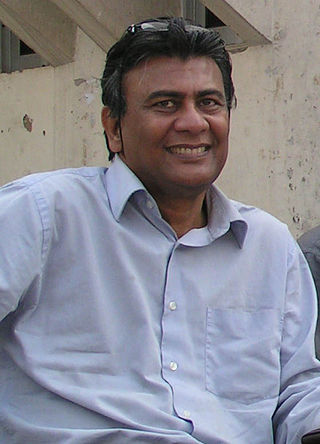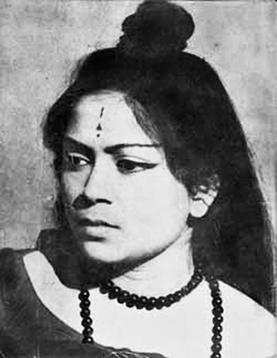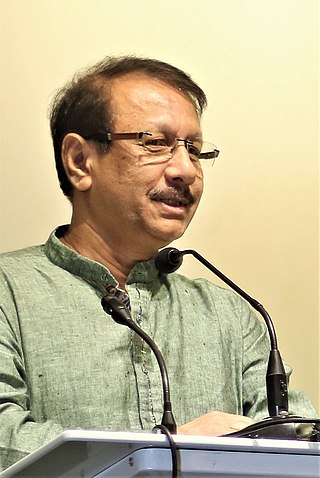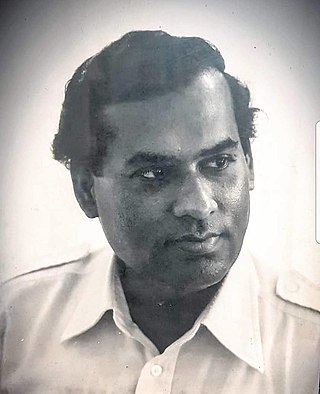
Humayun Ahmed was a Bangladeshi novelist, dramatist, screenwriter, filmmaker, songwriter, scholar, and academic. His breakthrough was his debut novel Nondito Noroke published in 1972. He wrote over 200 fiction and non-fiction books. He was one of the most popular authors and filmmakers in post-independence Bangladesh. Pakistani English newspaper Dawn referred to him as the cultural legend of Bangladesh.

Tareque Masud was a Bangladeshi independent film director, film producer, screenwriter and lyricist. He first found success with the films Muktir Gaan (1995) and Matir Moina (2002), for which he won three international awards, including the International Critics' FIPRESCI Prize, in the Directors' Fortnight at 2002 Cannes Film Festival. The film became Bangladesh's first film to compete for the Academy Award for Best Foreign Language Film.

Ekushey Padak is the second highest civilian award in Bangladesh, introduced in memory of the martyrs of the Bengali Language Movement of 1952. The award is given to recognize contributions in a number of fields, including culture, education, and economics. The Ministry of Cultural Affairs administers the award.
Ferdousi Mazumder is a Bangladeshi film, television and stage actress. She was awarded Ekushey Padak (1998), Independence Day Award (2020) and Bangla Academy Literary Award (2020) by the government of Bangladesh. As of 2009, on stage she has given over 1200 performances of about 35 plays, mostly for her own group, Theatre.

Shahnaz Rahmatullah was a Bangladeshi singer. Her notable songs are Ekbar Jete De Na Amar Chotto Sonar Gaye, Je Chilo Drishtir Shimanay and Ek Tara Tui Desher Kotha. She was the recipient of the Ekushey Padak in 1992 and Bangladesh National Film Award for Best Female Playback Singer for the film Chhutir Phande (1990).
Abdul Alim was a Bangladeshi folk singer. He won the Bangladesh National Film Award for Best Male Playback Singer in 1975 for playback in Sujan Sakhi. He was posthumously awarded the Ekushey Padak in 1977 and Independence Day Award in 1997 by the Government of Bangladesh.

Shimul Yousuf is a Bangladeshi actress, director, and singer. In 2023, she was awarded the Ekushey Padak, the second highest award for civilians in Bangladesh.

Chashi Nazrul Islam was a Bangladeshi film director and producer. He won Bangladesh National Film Award for Best Director twice for the films Shuvoda in 1986 and Hangor Nodi Grenade in 1997. He was awarded Ekushey Padak in 2004 by the Government of Bangladesh.

Qayyum Chowdhury was a Bangladeshi painter. Along with Zainul Abedin, Quamrul Hassan and Safiuddin Ahmed, he is considered as a first generation artist of Bangladesh. He was awarded the Ekushey Padak in 1984 and the Independence Day Award in 2014 by the Government of Bangladesh.

Dr. Jamilur Reza Choudhury was a Bangladeshi civil engineer, professor, researcher, and education advocate. He was an Adviser (Minister) to Caretaker Government of Bangladesh. He was the first vice chancellor of BRAC University and former vice chancellor of University of Asia Pacific. He was also the president of Bangladesh Mathematical Olympiad Committee from 2003. He was awarded Ekushey Padak by the Government of Bangladesh in the category of science and technology in 2017. He was inducted as a National Professor by the Government of Bangladesh in 2018.

Subhash Dutta was a Bangladeshi filmmaker, theater and film actor. He started his career as a commercial artist.

Novera Ahmed was a modern sculptor of Bangladesh. She was awarded Ekushey Padak by the Government of Bangladesh in 1997. Artist Zainul Abedin described her work saying "What Novera is doing now will take us a long time to understand – she is that kind of an artist."
Mita Haque was a Bangladeshi Rabindra Sangeet singer. She had 14 solo musical albums released from India and 10 musical albums released in Bangladesh. She was awarded Ekushey Padak by the government of Bangladesh in 2020 for her contributions to music.
Sayed Haider was a Bangladeshi physician and Language Movement activist. He along with Badrul Alam designed the first Shaheed Minar. It was then demolished by the Pakistani Army on 26 February 1952. For his contribution to the Language Movement he was awarded Ekushey Padak in 2016.

Kamal Abdul Naser Chowdhury is a Bengali poet and a member of the Bangladesh Civil Service. Currently he is the adviser to the prime minister of Bangladesh. He was the Chief Coordinator of the National Implementation Committee for the Celebration of Mujib Borsho, the Birth Centenary of Sheikh Mujibur Rahman, the founding father of Bangladesh. He is a former Principal Secretary of the Prime Minister of Bangladesh.

Nawazish Ali Khan is a television producer. His notable productions are Bohubrihi (1988-1989), Ayomoy (1990-1991), Jalsha (1994), Jononi(1993). He is currently serving as the CEO at Global Television.
Biswajit Ghosh is a Bangladeshi professor, essayist and researcher. He is a professor of the Bangla Department at Dhaka University and Incumbent Vice-Chancellor of the Rabindra University. He was awarded Bangla Academy Literary Award in 2011 and Ekushey Padak in 2019 for his contributions in research.
Khalid Hossain was a Bangladeshi Nazrul Geeti singer. In recognition of his contribution in music, the government of Bangladesh awarded him the country's second highest civilian award Ekushey Padak in 2000.

Mofidul Hoque is a Bangladeshi researcher, publisher and essayist. He is one of the founder trustees of the Bangladesh Liberation War Museum. He was awarded Ekushey Padak in 2016 and Bangla Academy Literary Award in 2013 by the government of Bangladesh.













